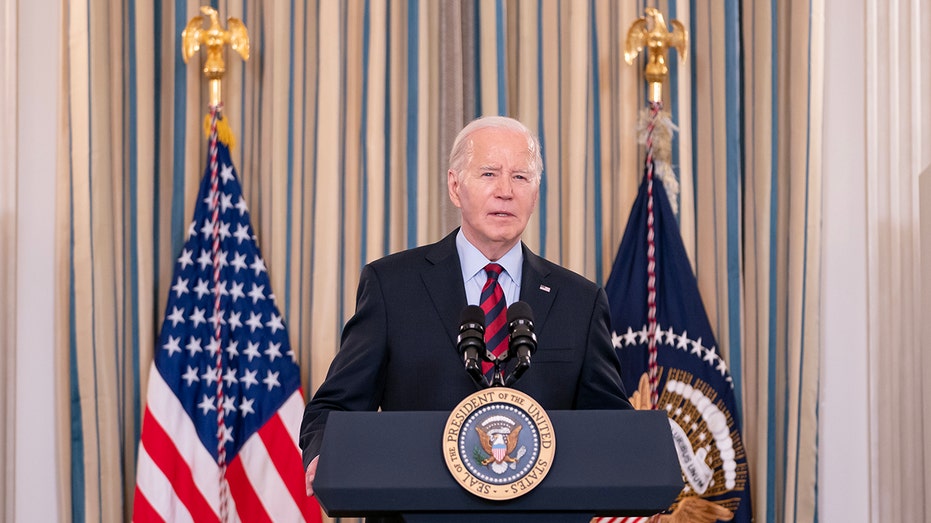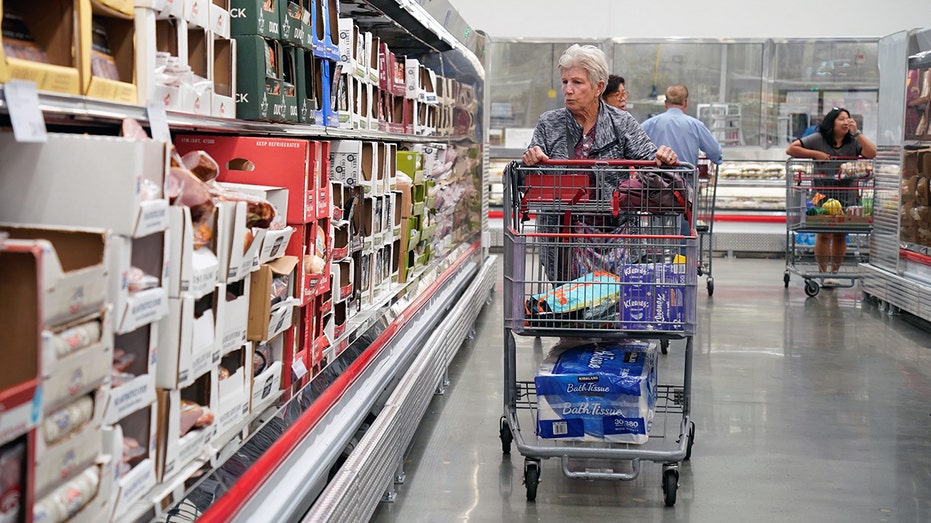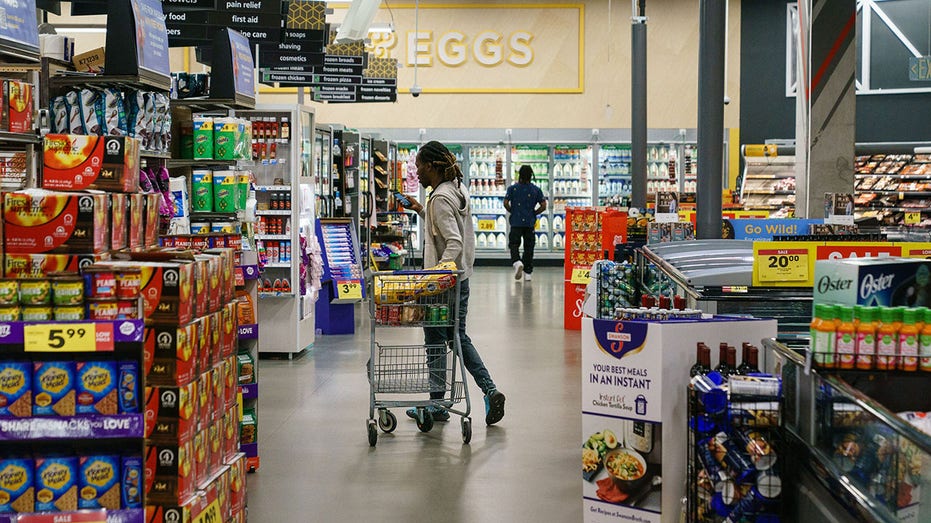Biden's COVID-19 spending comes back to bite as inflation remains high: economists
The White House chalked up inflation to the pandemic and the war in Ukraine
Inflation is here to stay: Bill Pulte
Pulte Capital CEO Bill Pulte discusses the impact of inflation on the housing industry.
President Biden and senior White House officials are scrambling to explain stubbornly-high inflation levels, which economic experts blame on the administration's own spending agenda.
Following the latest consumer price index (CPI) reading Wednesday, Biden said his top economic priority is fighting inflation but blamed businesses that are recording high profits and Republicans seeking to "slash taxes for billionaires." The CPI report published by the Bureau of Labor Statistics showed annual inflation accelerated 3.5%, faster than expected for a third straight month in March.
"Prices are still too high for housing and groceries, even as prices for key household items like milk and eggs are lower than a year ago," Biden said.
Deputy Biden Treasury Secretary Wally Adeyemo separately added in an interview with CNBC the administration's plan "is to do everything we can on our end" to fight inflation. And White House spokesperson Michael Kikukawa told FOX Business Thursday inflation was caused by supply chain and economic factors linked to the pandemic.
BIDEN CLAIMS INFLATION WAS 'SKYROCKETING' WHEN HE TOOK OFFICE, DESPITE DATA SHOWING OPPOSITE

President Biden has noted the rate of inflation has decreased from its 40-year high in 2022 and has committed to fighting high prices. (Nathan Howard/Getty Images / Getty Images)
At the beginning of this year, the gross U.S. national debt surpassed $34 trillion, a new record.
But several experts blamed Biden's actions for the persistent inflation levels. They noted he has pushed several massive spending packages, namely the American Rescue Plan and a $1.9 trillion COVID-19 stimulus package that have sunk the nation deeper into debt.
"Annual spending has leaped $2 trillion since 2019. Additionally, deficits doubled last year from $1 trillion to $2 trillion during peace and prosperity," Brian Riedl, an economist and senior fellow at the Manhattan Institute, told FOX Business. "So, the Biden administration is continuing to hit the gas pedal on fiscal policy and forcing the Federal Reserve to hit the gas pedal even harder.
"Of course, you're going to have inflation when Congress and the president are signing trillions of dollars in new spending and, again, pushing up annual deficits to $2 trillion a year. This is textbook expansionary fiscal policy. The harder the White House hits the gas on fiscal policy, the harder the Fed is going to have to hit the brakes on monetary policy. That just means higher interest rates and more pain for a lot of families."
HIGH INFLATION IS COSTING AMERICANS AN EXTRA $1K A MONTH
Congress passed the American Rescue Plan, which was among Biden's first priorities after taking office, in March 2021. The legislation sent stimulus checks worth $1,400 to most Americans and increased the child tax credit to between $3,000-3,600 per child.
An analysis by economists at the Federal Reserve Bank of San Francisco one year later showed U.S. inflation rates had outpaced other developed countries, largely due to "fiscal support measures designed to counteract the severity of the pandemic’s economic effect." The analysis showed that federal stimulus effforts, including the American Rescue Plan, boosted inflation by about 3%.

Customers shop at a supermarket in Foster City, Calif., Sept. 13, 2023. (Li Jianguo/Xinhua via Getty Images / Getty Images)
Riedl added that, in addition to stimulus spending passed in response to the pandemic, Biden's push for a student loan bailout plan, so-called Buy America rules, an expanded regulatory regime and new tariffs on foreign goods has also added to inflation and higher consumer prices.
E.J. Antoni, an economist and research fellow at The Heritage Foundation, further pointed to Biden's other major spending packages, like the $1.2 trillion Infrastructure Investment and Jobs Act and the $739 billion Inflation Reduction Act.
WHY ARE GROCERIES STILL SO EXPENSIVE?
"This last CPI print proves that inflation is not going anywhere anytime soon," Antoni told FOX Business. "If you look at the amount of spending that we have today, thanks to the infrastructure spending, thanks to the Inflation Reduction Act and other bloated spending bills that we've had in the last three years, you can see the direct correlation between that and the deficit – and the monetization of that debt by the Federal Reserve via growing the money supply.
"So, there's a very clear link between the government spending too much money and ultimately the consumer having to pay for that spending via higher consumer prices."

High inflation has created severe financial pressures for most U.S. families, which are forced to pay more for everyday necessities like food and rent. (Elijah Nouvelage/AFP via Getty Images / Getty Images)
Marc Goldwein is the senior policy director of the Committee for a Responsible Federal Budget, a nonprofit public policy organization based in Washington, D.C. He argued inflation could be tied to COVID-19 stimulus packages, which funneled money into the economy rapidly rather than spending earmarked in other legislation, which has largely gone unspent since they were passed.
Goldwein warned that the nation's growing deficit remains a key issue that is only exacerbated by spending increases.
GET FOX BUSINESS ON THE GO BY CLICKING HERE
"The major money that we spent on COVID, starting in the Trump administration and then especially the American Rescue Plan under President Biden, were a significant contributor to the inflation that we saw in 2021, 2022," he said. "Other things like the student debt pause, various Buy America regulations, other things that the Biden administration has done since, have contributed."
In response to the criticisms, the White House issued a statement.
"The once-in-a-century pandemic and Putin’s war in Ukraine disrupted supply chains, spending patterns and food and energy markets, causing inflation to spike around the world. Indeed, inflation was worse in many other countries," Kikukawa wrote to Fox Business.
"If you want to talk about the economic effects the American Rescue Plan had on our economy, here’s one: Under President Biden, the U.S. has had the strongest economic recovery of any leading economy, with unemployment below 4% for the longest stretch in over 50 years."





















